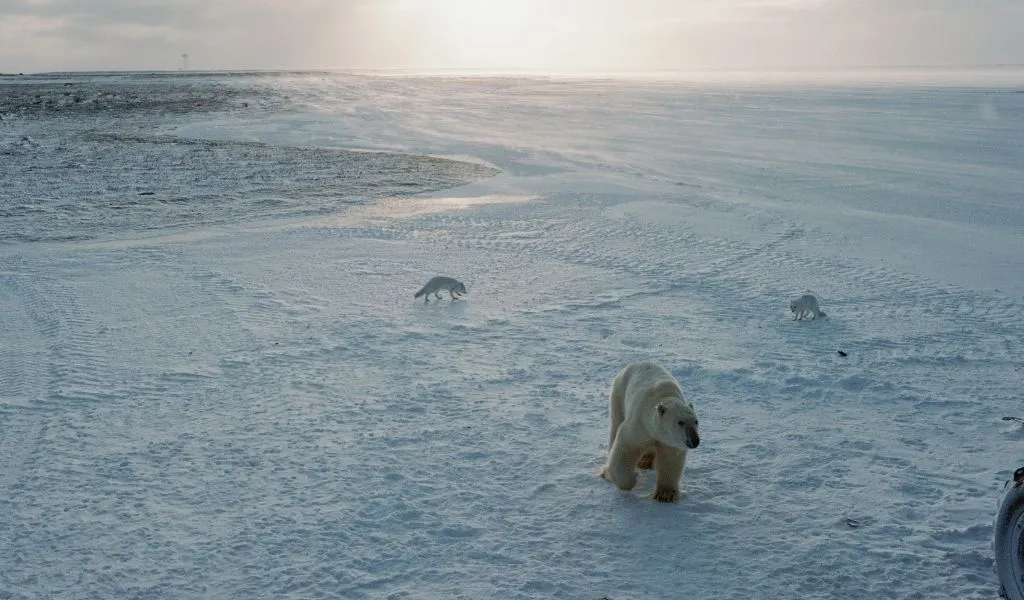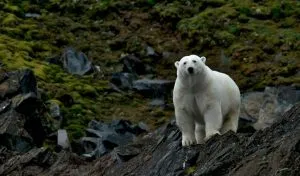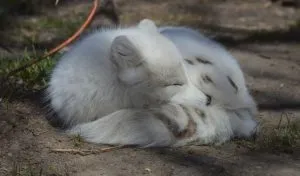Polar bears (Ursus maritimus) are arguably the top predators of the arctic where they share a habitat with the smaller arctic fox (Vulpes lagopus). But, do polar bears eat arctic foxes?
No, polar bears do not usually eat arctic foxes. They prefer to hunt seals and other marine mammals since their blubber is high in energy so they do not need to eat a lot relative to their weight. However, being opportunistic hunters, they may hunt arctic foxes when food is scarce.
Keep reading to find out more about the relationship between arctic foxes and polar bears and why they can oftentimes be seen sharing food.
Do Polar Bears Eat Arctic Foxes?
For the most part, polar bears do not hunt arctic foxes, instead, they focus on hunting marine mammals such as seals which are abundant in winter.
Polar bears are well adapted to catching marine prey with their long neck for reaching into holes in the ice, sharp claws, and the ability to swim well when necessary1 (source: Polar Bear, M. Fee, 2019).
The blubber of seals is high in energy so polar bears do not need to eat too much relative to their size. This helps them build up their own fat reserves ahead of the summer when they migrate to the mainland.
Being opportunistic, if the opportunity arises to catch and eat an arctic fox, a polar bear would not hesitate when other food is scarce.
Arctic foxes tend to follow polar bears and feed off the carcasses that they leave behind. This strategy can backfire and result in the arctic fox being hunted.
Although arctic foxes are faster than polar bears with a top speed of 50 km/h (31 mph) compared to 40 km/h (25 mph)2 (source: Seaworld) and more nimble, polar bears have a unique ability to dig them out from their dens which they often use to evade predators3 (source: Government of Newfoundland and Labrador, Fisheries, Forestry and Agriculture).
What Do Polar Bears Eat?
Watch the video version here or keep reading below:
So, if polar bears don’t primarily prey on arctic foxes, what do they eat? The main food sources of a polar bear include:
- Ringed and bearded seals – This is the primary prey of a polar bear in winter. They will sit and wait for seals to appear through holes in the breathing holes or may use the ice as a launchpad to catch seals in the sea4 (source: Polar Biology, M/ Galicia, et al, Vol 38, No. 12, 2015).
- Larger marine mammals – Polar bears will also catch other marine mammals such as beluga whales, narwhals, and walrus. Polar bears are strong swimmers and have sharp claws and teeth which allow them to catch huge whales up to 1500kg.
- Terrestrial animals – Being opportunistic, polar bears will eat land mammals too, especially in summer when they cannot catch marine-based prey. This includes caribou, snow geese, arctic foxes. They are also known to eat sea birds in coastal areas.
- Other food sources – With their winter hunting period being shortened by climate change and melting sea ice, they are increasingly opting to include plant-based vegetation in their diets during summer. This includes Lyme grass seed heads, berries, and marine algae5 (source: BMC Ecology, L. J. Gormezano and R. F. Rockwell, Vol 13, Issue 51, 2013).
What Are the Predators of Arctic Foxes?
Surprisingly, the main predator of the arctic fox is the red fox. Due to changing climates, the red fox is increasingly encroaching on the territory of the arctic fox where they compete for similar resources.
The red fox will hunt arctic foxes to reduce competition for resources, this is known as intraguild predation. Red foxes are one of the reasons why arctic foxes have become endangered in some regions6 (source: IUCN Red List).
Other natural predators of the arctic fox include wolves, wolverines, golden eagles, snowy owls, and polar bears. Again, most of these predators hunt arctic foxes to reduce competition for smaller mammals rather than as a food source.
Related Questions
Why Do Arctic Foxes Follow Polar Bears?
We mentioned earlier that arctic foxes will often follow polar bears, but why would they do this if there is a chance the polar bear will prey on them? Well, polar bears leave behind carcasses of seals and other marine mammals.
Polar bears prefer the blubber of seals and will leave the meaty parts, this is perfect for arctic foxes to scavenge on. During times of abundant food, arctic foxes and polar bears can be seen sharing food such as in this YouTube video.



![Read more about the article How Long Do Polar Bears Live? [Lifespan and Causes of Death]](https://polarguidebook.com/wp-content/uploads/2021/09/how-long-do-polar-bears-live-300x176.jpg)

